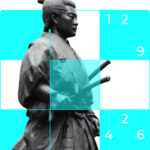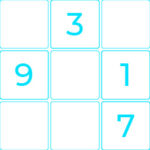Sudoku, a puzzle game of Japanese origin, has become a worldwide sensation and is loved by both young and old. At first glance, it may seem intimidating with its grid of numbers, but don’t be fooled. This article explains how simple the Sudoku game really is and how, with a little patience and practice, anyone can learn it and excel at this fascinating puzzle.
Table of Contents
Simple game rules
Sudoku is a logic puzzle played on a grid of 9×9 squares. This grid is further subdivided into nine smaller squares, each consisting of 3×3 cells. These smaller squares are often called ‘regions’ or ‘blocks’.
Rows: There are 9 horizontal rows in the grid. According to the rules of Sudoku, each number from 1 to 9 may appear only once in each row.
Columns: There are also 9 vertical columns in the grid. As with the rows, each number from 1 to 9 may only appear once in each column.
Blocks or regions: These are the nine 3×3 squares that together form the large 9×9 grid. In each of these 3×3 blocks, each number from 1 to 9 may only appear once.
When you start a Sudoku puzzle, some boxes are already provided with numbers. These are the ‘given’ figures. The player’s goal is to fill in the blanks according to the rules above.
The great thing about Sudoku is that there is only one unique solution to each puzzle, which can be achieved through purely logical reasoning. You don’t have to do any math or guess. If you work in a systematic way and pay close attention to the numbers already entered, you can find the solution. Believe us, it’s really easy to learn.

Progressive difficulty levels in sudoku
You can learn to play Sudoku at different levels. From very simple to very advanced. This means that Sudoku has a suitable level for everyone.
What determines the difficulty level?
The difficulty of a Sudoku puzzle is usually determined by two main factors: the number of numbers already given (the starting clues) and the types of logical techniques required to solve the puzzle.
Easy puzzles
These are ideal for sudoku beginners to start learning the game. They often have more given numbers and the relationships between the numbers are more direct and easier to find. These puzzles usually allow the player to quickly fill in multiple numbers without thinking too hard.
Average puzzles
These puzzles require a little more logical reasoning. There may be fewer numbers given and the player may need to use more advanced techniques to find the solution.
Difficult and very difficult puzzles
These puzzles often require more advanced strategies and techniques and are harder to learn. There may be fewer clues and the relationships between the numbers are often more subtle and complex.
Learning through progression
By starting with simpler puzzles, players can become familiar with the basic strategies of Sudoku. As they learn to become more skilled, they can move on to more difficult puzzles and learn new techniques. This gradual learning process allows players to build their skills without becoming overwhelmed.
Develop strategies
While beginners may focus on immediately visible solutions, such as finding rows, columns, or blocks where only one possible number fits, more experienced players will explore deeper strategies such as ‘naked twins’, ‘dot method’, and other techniques.
By starting at a lower level and gradually attempting more difficult puzzles, players can strengthen their understanding and skill in Sudoku, making it both challenging and rewarding.

No mathematical knowledge required
Not everyone is equally good at math, but you don’t need to. Sudoku does not require any mathematical knowledge to learn the game.
Numbers as symbols
In Sudoku, numbers are used, but not in their mathematical context. The numbers 1 to 9 can just as well be replaced by nine different symbols, colors, or letters. The point is that each of these nine unique elements only appears once in each row, column, and 3×3 block.
Logic over math
Sudoku is about logical reasoning and ruling out possibilities. For example, if a certain number already appears in a row and a column that intersects a specific box, you can conclude that that number cannot appear in that box again. No formulas, additions, multiplications, or other mathematical calculations are required.
Pattern recognition
One of the skills players develop while playing Sudoku is the ability to recognize patterns. By looking at the layout of the given numbers and the numbers you’ve already entered, you can often predict which numbers might go where, or which cells are most likely to be solved.
Accessible to everyone
Because Sudoku does not rely on mathematical calculations, it is accessible to people of all ages and backgrounds, even those who do not consider themselves “mathematical.” This makes it a universal game.
Training in logical thinking
Playing Sudoku can even help improve logical thinking skills, as you must continually form and test hypotheses and consider the consequences of each choice.

Availability of tools for sudoku
Sudoku is played worldwide by young and old. This has created a range of online resources. But we at Happy Hippo also offer various resources online and in-app to learn how to play the game.
Online Tutorials and Courses
There are many websites that offer comprehensive guides and tutorials for both beginners and advanced players. We also explain the basic and advanced Sudoku strategies and provide many tips & tricks about common pitfalls and solutions. You can learn all about the basics in our SudokuX Academy.
In-Apps tools
SudokuX, like many other Sudoku apps, has very useful features such as hints, step-by-step solutions, writing multiple numbers in one box (as potential options), automatic saving of your progress, and timers to track your speed.
Books
For those who prefer to learn offline, many books have been published on Sudoku. These range from beginner books with simple puzzles and tips to advanced Sudoku books that contain in-depth strategies and complex puzzles.
Online Forums and Communities
There are online communities and forums where Sudoku enthusiasts come together to discuss strategies, share puzzles, or ask for help. These communities can be a great source of knowledge and support for learning how to play Sudoku.
Paper newspapers and magazines
Many newspapers have a daily Sudoku puzzle, and there are also magazines devoted solely to Sudoku and other puzzles. These are great for people who prefer to work on paper rather than digitally.
Feedback
One of the benefits of using a digital Sudoku app is instant feedback. For example, if you make a mistake, you are immediately notified that there is an inconsistency, which helps with the learning process.
With so many resources available, it’s easier than ever for beginners to jump in and learn how to play sudoku, while advanced players can continue to refine their skills and discover new strategies.
Practice makes perfect
Also within the context of Sudoku, practice makes perfect. In other words, everyone can learn it.
Beginner mistakes
When people first learn a skill or game such as Sudoku, it is normal to make mistakes. The important thing is to understand that everyone can learn from mistakes and that these mistakes are essential learning moments.
Step-by-step progress
No one becomes an expert at Sudoku overnight. By playing regularly, you too will slowly but surely discover and learn different strategies and techniques. What initially seems like a complex puzzle becomes easier over time as you recognize the patterns and techniques.
Brain training
Just as physical exercises strengthen the muscles, regularly solving Sudoku puzzles helps to train the brain. Everyone, regardless of age or background, has the ability to strengthen his or her cognitive skills, such as logical thinking and pattern recognition, through practice.
Encouragement
It is important to realize that everyone learns at a different pace. In the beginning, Sudoku is a race against the clock. What may be easy for one person at first may be challenging for another. The key word here is perseverance. Confidence grows with each completed Sudoku puzzle.
Variety
There are Sudoku puzzles available at varying levels of difficulty, meaning everyone can start somewhere they feel comfortable with. As skills improve, players can gradually move on to more challenging puzzles.
Communal learning
Sharing experiences, discussing strategies with friends or online communities, or even solving puzzles together can speed up the learning process and make it more fun.

Sudoku is for everyone
With Sudoku, as with any skill, it is essential to have patience and practice regularly. Regardless of one’s background or previous experience, with dedication and time, anyone can master the game. The most important thing is to enjoy the learning process and the satisfaction that completing each puzzle provides.
FAQs for “Sudoku: A Game Anyone Can Learn”
What is Sudoku and where did it originate?
Answer: Sudoku is a logic puzzle game that originated in Japan. It’s played on a 9×9 grid, divided further into nine 3×3 blocks or regions. The objective is to fill the grid with numbers from 1 to 9, following specific rules to ensure each number appears only once in each row, column, and block.
Do I need mathematical skills to play Sudoku?
Answer: No, Sudoku does not require any mathematical calculations. While the game uses numbers from 1 to 9, they serve as symbols. It’s all about logical reasoning, pattern recognition, and eliminating possibilities. The numbers could easily be replaced by symbols, colors, or letters, and the game would remain the same.
How is the difficulty level of a Sudoku puzzle determined?
Answer: The difficulty of a Sudoku puzzle is influenced by two primary factors: the number of numbers already given (the starting clues) and the logical techniques needed to solve it. Easier puzzles often have more given numbers and more straightforward relationships, while more challenging puzzles might require deeper strategies and have fewer initial clues.
Are there any tools or resources available to help me get better at Sudoku?
Answer: Absolutely! From online tutorials, apps like SudokuX, books, and online forums to daily puzzles in newspapers, there’s a plethora of resources available. Whether you’re a beginner or an advanced player, there are tools and communities out there to help you learn, practice, and master the game.
Can playing Sudoku benefit my cognitive health?
Answer: Yes, playing Sudoku can act as a brain exercise. By consistently challenging yourself with Sudoku puzzles, you can improve logical thinking skills, pattern recognition, and memory. Just like physical exercises strengthen muscles, cognitive exercises like Sudoku can help keep the brain sharp.
